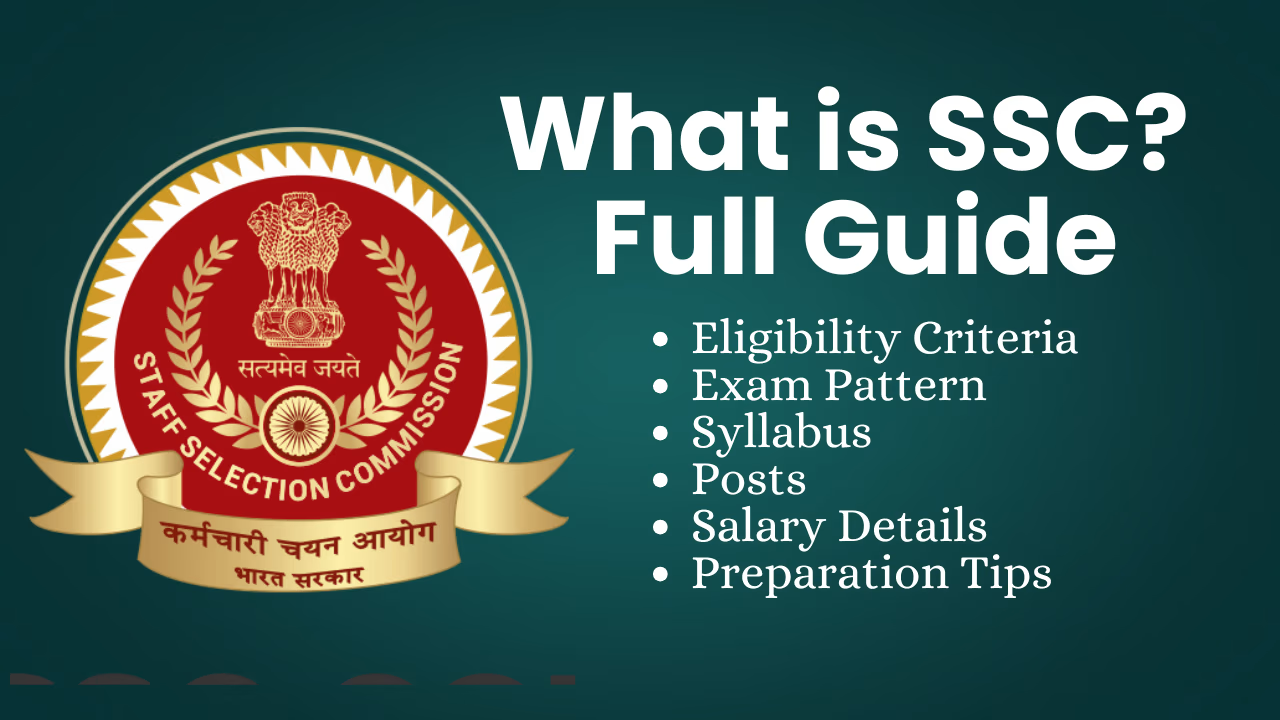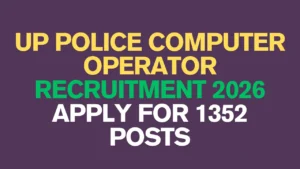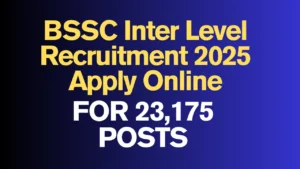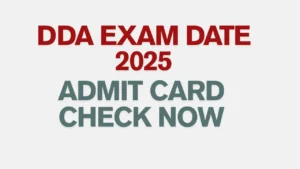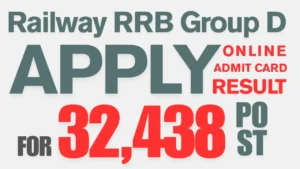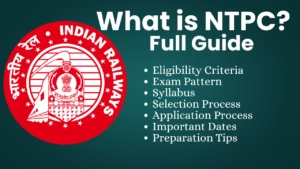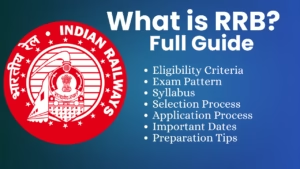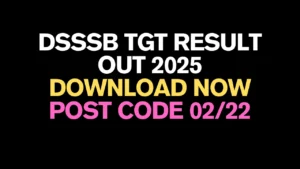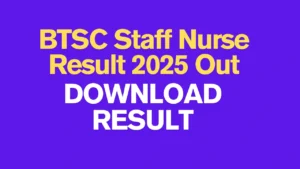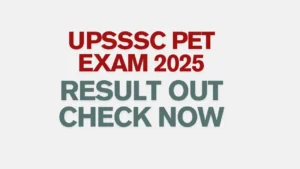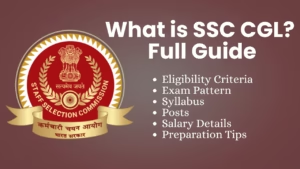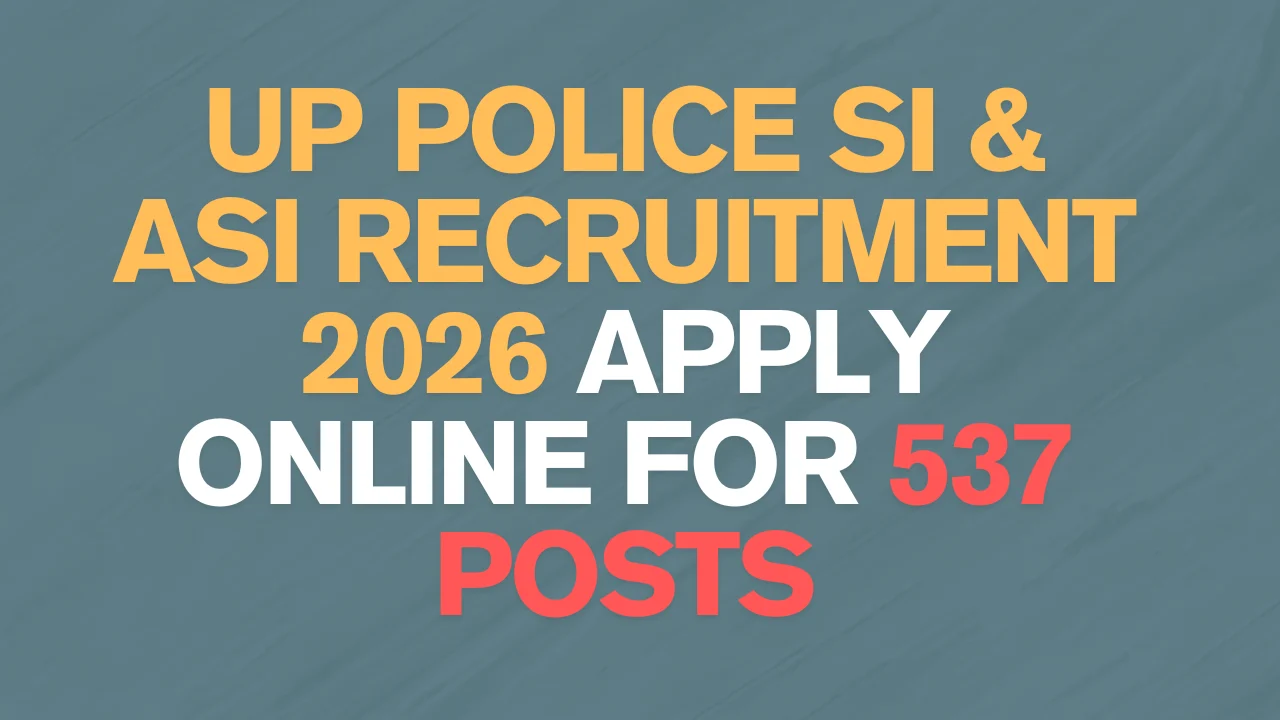Are you aiming for a stable and prestigious government job in India? Then you’ve surely come across the term SSC — one of the top recruiting bodies for central government positions. But what exactly is SSC? What are the exams conducted under it? Who can apply? And what kind of jobs or salaries can you expect?
In this complete 2025 guide, we’ll break down everything you need to know about SSC — including its full form, eligibility criteria, popular exams like SSC CGL, CHSL, MTS, and the career opportunities it opens up.
Whether you’re a student, graduate, or job seeker, this article will help you take your first confident step toward cracking an SSC exam and securing a government job.
What is the Full Form of SSC?
The full form of SSC is the Staff Selection Commission. It is a central government organization in India responsible for recruiting staff for various posts in the numerous Ministries and Departments of the Government of India and in Subordinate Offices.
Think of SSC as one of the largest recruiting agencies in the country, conducting a wide range of examinations every year for non-gazetted Group ‘B’ and Group ‘C’ posts.
The Role and Importance of SSC in India
Established in 1975, the Staff Selection Commission plays a crucial role in the functioning of the central government. Its primary responsibility is to conduct competitive examinations and interviews to select eligible candidates for a huge variety of roles.
Why is SSC so important for job seekers?
- Gateway to Government Jobs: It’s one of the most prominent paths to secure a central government job, which offers job security, a good salary, and numerous benefits.
- Transparency and Fairness: SSC ensures a transparent and merit-based selection process, giving every eligible candidate a fair chance.
- Variety of Posts: From clerical positions to sub-inspector roles, SSC recruits for a diverse range of jobs catering to different educational qualifications.
- Nationwide Reach: SSC conducts exams across the country, making it accessible to candidates from all states and union territories.
For Rojgar Point readers, understanding SSC is the first step toward building a successful career in the government sector.
Major Examinations Conducted by SSC
SSC is known for its flagship examinations that attract lakhs of applicants every year. Each exam targets different educational levels and leads to different types of government posts. Here are the most popular ones:
- SSC Combined Graduate Level (CGL): The most sought-after exam for graduates. It’s the gateway to prestigious posts like Inspector, Assistant Section Officer, and Sub-Inspector in departments like CBDT, CBIC, CBI, and NIA.
- SSC Combined Higher Secondary Level (CHSL): This exam is for candidates who have passed their 12th standard. It recruits for posts like Lower Divisional Clerk (LDC), Junior Secretariat Assistant (JSA), and Data Entry Operator (DEO).
- SSC Multi-Tasking (Non-Technical) Staff (MTS): This exam is for candidates who have passed their 10th standard. It recruits for non-technical roles in various central government offices.
- SSC GD Constable: This is a major recruitment drive for the post of Constable (General Duty) in forces like BSF, CISF, CRPF, ITBP, SSB, and Rifleman in Assam Rifles. The minimum qualification is 10th pass.
- SSC CPO (Central Police Organization): This exam is for recruiting Sub-Inspectors (SI) in the Delhi Police and Central Armed Police Forces (CAPFs).
- SSC Stenographer (Grade ‘C’ & ‘D’): This exam is for candidates with stenography skills who have passed the 12th standard.
- SSC Junior Engineer (JE): This exam recruits Junior Engineers in various government departments for disciplines like Civil, Mechanical, and Electrical engineering.
SSC Eligibility Criteria: Who Can Apply?
While each SSC exam has specific eligibility criteria, there are some general requirements that apply to most of them. These are based on nationality, age, and educational qualifications.
General Eligibility at a Glance
| Criteria | Requirement |
| Nationality | Must be a citizen of India (or a subject of Nepal/Bhutan, or a Tibetan refugee, as per specific rules). |
| Educational Level | Varies from 10th Pass (Matriculation) to Graduation, depending on the exam. |
| Age Limit | Generally ranges from 18 to 32 years. Specific age limits vary by post and category. |
| Age Relaxation | Provided for reserved categories like SC/ST, OBC, and Ex-Servicemen as per government norms. |
Let’s break down the qualification and age limits for the major exams.
Detailed Eligibility for Popular SSC Exams
| Exam Name | Minimum Educational Qualification | General Age Limit |
| SSC CGL (Combined Graduate Level) | Bachelor’s Degree (Graduation) | 18 – 32 years (varies by post) |
| SSC CHSL (Combined Higher Secondary Level) | 12th Standard (Intermediate) Pass | 18 – 27 years |
| SSC MTS (Multi-Tasking Staff) | 10th Standard (Matriculation) Pass | 18 – 25/27 years (varies by post) |
| SSC GD Constable | 10th Standard (Matriculation) Pass | 18 – 23 years |
| SSC CPO (Sub-Inspector) | Bachelor’s Degree (Graduation) | 20 – 25 years |
| SSC Stenographer Grade ‘C’ & ‘D’ | 12th Standard (Intermediate) Pass | 18 – 30 years (Grade C) & 18 – 27 years (Grade D) |
| SSC JE (Junior Engineer) | Diploma or Degree in Engineering | Up to 32 years (varies by department) |
Note: Always check the official SSC notification for the specific exam you are interested in, as age limits and qualifications can sometimes be updated. Stay tuned to Rojgar Point for the latest updates!
Understanding the SSC Exam Pattern and Selection Process
The selection process for SSC exams typically involves multiple stages, which are designed to test a candidate’s aptitude, knowledge, and skills. While the pattern varies for each exam, it generally includes Computer-Based Examinations (CBE).
General Exam Structure
Most SSC exams consist of the following subjects in their preliminary or Tier-1 stage:
- General Intelligence and Reasoning: Tests logical and analytical abilities.
- General Awareness: Covers current affairs, history, geography, science, and general knowledge.
- Quantitative Aptitude: Includes topics from arithmetic and advanced mathematics.
- English Comprehension: Tests vocabulary, grammar, and reading skills.
Tier-wise Selection Process (Example: SSC CGL)
The SSC CGL exam is a great example to understand the multi-stage process.
- Tier-I: Preliminary Exam: This is a computer-based objective test that is qualifying in nature. The marks are used to shortlist candidates for the next stage.
- Tier-II: Mains Exam: This stage is also a computer-based exam. It includes papers on Quantitative Abilities, English Language, General Studies, and for some posts, Statistics or Finance. This is the main scoring stage.
- Tier-III (If applicable): This used to be a descriptive paper, but now, for many posts, it has been replaced by a Computer Proficiency Test (CPT) or a Data Entry Skill Test (DEST).
- Document Verification: After clearing all the stages, candidates are called for document verification to check their eligibility.
- Final Merit List: The final selection is based on the cumulative performance in the scoring tiers (mainly Tier-II).
SSC Salary Structure: A Rewarding Career
One of the biggest attractions of an SSC job is the handsome salary and the benefits that come with it. The salary is based on the 7th Pay Commission, and the posts are categorized into different Pay Levels.
The salary in an SSC job depends on the Pay Level of the post and the city of posting. Cities are classified as Class X (Metropolitan), Class Y, and Class Z for House Rent Allowance (HRA) calculations.
SSC CGL Post-wise Salary (In-Hand Estimate)
This table gives an idea of the approximate monthly in-hand salary for various SSC CGL posts.
| Pay Level | Posts | Grade Pay | City X (Approx. In-Hand) | City Y (Approx. In-Hand) | City Z (Approx. In-Hand) |
| Level 8 | Assistant Audit Officer (AAO), Assistant Accounts Officer (AAO) | ₹4800 | ₹78,000 – ₹85,000 | ₹73,000 – ₹80,000 | ₹69,000 – ₹75,000 |
| Level 7 | Inspector (Examiner/Preventive Officer), Assistant Section Officer (ASO), Sub-Inspector (CBI) | ₹4600 | ₹70,000 – ₹77,000 | ₹65,000 – ₹71,000 | ₹61,000 – ₹66,000 |
| Level 6 | Divisional Accountant, Junior Statistical Officer (JSO), Sub-Inspector | ₹4200 | ₹58,000 – ₹64,000 | ₹54,000 – ₹59,000 | ₹50,000 – ₹55,000 |
| Level 5 | Auditor, Accountant | ₹2800 | ₹48,000 – ₹53,000 | ₹44,000 – ₹48,000 | ₹41,000 – ₹45,000 |
| Level 4 | Tax Assistant, Upper Division Clerk (UDC) | ₹2400 | ₹41,000 – ₹46,000 | ₹37,000 – ₹41,000 | ₹34,000 – ₹38,000 |
Salary for Other SSC Exams (Approximate)
- SSC CHSL (LDC/JSA): Pay Level 2, approx. ₹30,000 – ₹37,000 in-hand.
- SSC MTS: Pay Level 1, approx. ₹27,000 – ₹33,000 in-hand.
- SSC GD Constable: Pay Level 3, approx. ₹32,000 – ₹38,000 in-hand.
How to Prepare for SSC Exams: A Winning Strategy
Cracking an SSC exam requires dedication, consistency, and a smart preparation strategy. Here’s a roadmap provided by Rojgar Point to guide you:
- Understand the Syllabus and Exam Pattern: Before you start, thoroughly analyze the syllabus and the latest exam pattern. This is the most crucial step.
- Create a Realistic Timetable: Allocate time for each subject based on your strengths and weaknesses. Consistency is key.
- Build Strong Fundamentals: Start with NCERT books (Class 6-10 for GS, and up to Class 10 for Math) to build a strong foundation.
- Choose the Right Study Material: Refer to standard books recommended by toppers. For Quantitative Aptitude, books by R.S. Aggarwal or Kiran Prakashan are popular. For English, refer to Plinth to Paramount or Wren & Martin.
- Focus on Practice and Mock Tests: The secret to success in SSC is practice. Solve previous year papers and take regular mock tests to improve your speed and accuracy. Analyze your performance after each mock.
- Stay Updated with Current Affairs: Read newspapers (like The Hindu or The Indian Express) and monthly current affairs magazines daily. This is vital for the General Awareness section.
- Revise Regularly: Make short notes for quick revision. Regular revision helps in retaining information for a longer period.
Why Choose a Career Through SSC?
A job secured through SSC is more than just a source of income. It’s a career that offers:
- Job Security: Government jobs are known for their stability, free from the uncertainties of the private sector.
- Work-Life Balance: Fixed working hours allow you to maintain a healthy balance between your professional and personal life.
- Perks and Allowances: Besides the basic salary, employees get Dearness Allowance (DA), House Rent Allowance (HRA), Travel Allowance (TA), and other benefits.
- Social Respect: A government job holds a position of prestige and respect in Indian society.
- Career Growth: SSC offers a well-defined path for promotions and career progression.
Frequently Asked Questions (FAQs)
Q1: Is an SSC job a good career choice?
Ans: Absolutely! An SSC job offers excellent career stability, a good salary, social prestige, and a great work-life balance, making it a highly sought-after career path.
Q2: Are SSC exams conducted every year?
Ans: Yes, major SSC exams like CGL, CHSL, MTS, and GD Constable are conducted annually, providing regular opportunities for aspirants.
Q3: Can a final-year student apply for SSC CGL?
Ans: Yes, final-year graduation students can apply for SSC CGL, but they must possess the degree certificate by the cutoff date mentioned in the official notification.
Q4: Is there a negative marking in SSC exams?
Ans: Yes, most SSC computer-based exams have a negative marking scheme. Typically, 0.50 marks are deducted for each wrong answer in exams where questions carry 2 marks, and 0.25 for questions carrying 1 mark.
Q5: What is the official website for SSC?
Ans: The new official website for all SSC related information, notifications, and applications is ssc.gov.in.
For all the latest updates on SSC recruitments, exam dates, and results, keep visiting your trusted source, Rojgarpoint.in!

